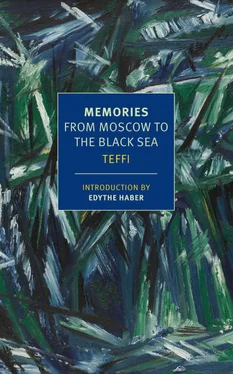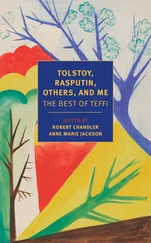“Charming characters!” says Averchenko. “Try to ignore them. Think about something cheerful.”
I do as he says. Tonight, the lights will be switched on at the theater, people will gather and sit in their seats and will listen to:
Cupid can’t be canned,
Cupid can’t be kind.
Stupid Cupid turns a man
Blinder than blind.
Oh why do I have to remember this? This idiotic refrain—spinning round and round in my poor head!
The women carry on chatting happily about how jolly it would have been to throw the thief under the wheels and about how he must be lying on the ground now with a smashed head.
“Lynch every one of ’em! Yes, him and every one of his sort. Poke out their eyes, rip out their tongues, cut off their ears, and then tie a stone round their necks and—into the water with ’em!”
“Back in our village we’d drag ’em under the ice on a rope, from ice-’ole to ice-’ole…”
“Oftentimes they was burned on a fire.”
Thank God they were diverted by the thief. Otherwise who knows what they’d have done to us?
Cupid can’t be canned,
Cupid can’t be kind.
“How awful!” I say to Averchenko.
“Sh!”
“I don’t mean them,” I continue. “I have torments of my own, I can’t get Silva out of my head.”
I shall think instead about how we might have been roasted, maybe that will do the trick. First I think about the pockmarked woman sitting opposite me. She’d be hard at it! She’s thorough. She’d be blowing on the kindling. And Gooskin? He’d be shouting, “Please excuse me, but we have a legally binding contract! You are preventing her from fulfilling her part of our agreement, and you are bankrupting me as an impresario! First she must pay me a forfeit!”
The “stupid cupid” gradually withdraws. It fades and dies away.
The train pulls into a station. Women with bundles start bustling about. The thump of soldiers’ boots. Bags, sacks, and baskets obscure the light of day. And then, on the other side of the glass, I see Gooskin. His face is twisted in terror. For the past few hours he’s been in a different car. What on earth has happened to him?
He looks ghastly. White all over, gasping for air.
“Get out quick! We must take a different route. This route’s out of the question. I’ll explain later.”
Well then, so be it. We get off the train. I’m rather slow, the last one out. When I finally jump down onto the platform, a ragged beggar boy comes up to me and says very clearly, “Stupid Cupid can’t be canned. Fifty kopeks, please!”
“Wha-at?”
“Fifty kopeks! Stupid Cupid.”
It’s all over. I’ve gone mad. I’m hearing things. My weak nerves must have been incapable of withstanding the combination of Silva and the people’s wrath.
I look around for our group; I need moral support. Averchenko is studying his gloves with extraordinary attentiveness and doesn’t respond to my mute appeal. I slip the boy fifty kopeks. I still don’t understand, but I have my suspicions.
“Admit it!” I say to Averchenko.
He gives an embarrassed laugh.
“While you were still in the train car,” he says, “I asked the boy if he wanted to earn a little money. I said a passenger in a little red hat was about to get off the train. ‘You go up to her,’ I told him, ‘and say, “Stupid Cupid can’t be canned!” She gives fifty kopeks to everyone who says that to her.’ Well, he seems like a bright boy!”
Gooskin, who’s been busying himself with our luggage, walks over. He is drenched in sweat.
“Wonderful!” he says in a ghastly whisper. “That bandit has gone and got himself shot!”
“What bandit?”
“That commissar of yours! What don’t you understand? Well? He’s been executed for robbery and bribe-taking. We can’t cross the border here. We’ll be fleeced—and then slaughtered to boot. We must cross somewhere else.”
All right then, a different border crossing it is. About two hours later we get onto another train and set off in another direction.
We arrived at the border station in the evening. It was cold. We wanted to go to bed. But we were anxious: What did this place have in store for us? When would they let us through and how would we continue our journey?
Gooskin and Averchenko’s impresario went off into the station building to assess the situation and conduct negotiations, giving us strict instructions to stay where we were. The omens did not bode well.
The platform was empty. Occasionally a dark figure would appear—maybe a guard, maybe a peasant woman in a soldier’s great-coat. This figure would cast a suspicious look in our direction, then disappear again. We waited for a long time. Finally, Gooskin emerged—escorted by no fewer than four men.
One of the four came rushing up to us. I shall never forget him: a thin, dark little man with a crooked nose, wearing a student’s cap and a huge, magnificent beaver coat that trailed behind him like a royal mantle in some throne-room portrait. The coat was brand new, evidently only just ripped off somebody’s back.
The little man ran up to us. With what seemed like a habitual movement he hitched up his trousers with his left hand, then raised his right hand high in the air with inspired rapture, and exclaimed, “Are you Teffi? Are you Averchenko? Bravo, bravo, and bravo! Here I am at your service, the commissar of arts for this shtetl, [20] The Russian word mestechko (literally “little place”) was used for settlements too large to be classed as villages but too small to be classed as cities. From 1791, Jews were generally only permitted to live within “the Pale of Settlement” (a region roughly corresponding to present-day Belarus, western Ukraine, eastern Poland, and the Baltic republics). Even within the Pale, Jews were generally prohibited from living in either large cities or small villages. Most Jews, therefore, lived in shtetls. In April 1917, the Pale of Settlement was abolished.
here at your service! Our cultural needs here are immense. You, our dear guests, will stay with us and help me to organize a series of cultural evenings—you will give readings and the local proletariat will act out your plays, under your supervision.”
The actress with the little dog gave a quiet gasp and sank down onto the platform. I looked around me. Dusk. A tiny station building with a small garden. Beyond it—miserable little houses, a boarded-up food stall, mud, a bare willow and a crow. And this Robespierre. [21] Maximilien de Robespierre (1758–1794) was one of the most important figures of the French Revolution. Accused of being the “soul” of the Reign of Terror, he was arrested and executed in July 1794.
“We would, of course, love to,” Averchenko said calmly, “but unfortunately we have booked a theater in Kiev for our performances, and we really do have to hurry.”
“Out of the question!” cried Robespierre. Abruptly lowering his voice, he added, “You will never be allowed across the border unless I put in a special request on your behalf. And what might induce me to make such a request? The fact that you have responded to the needs of our proletariat. Then I will even be able to arrange for your luggage to be let through!” [22] The shtetl Teffi and her companions have just reached is Unechka, in Bryansk province. For a few months this unremarkable town assumed great importance, as the frontier station on the main route between Moscow and Kiev. The Cheka was exceptionally active there, not only seizing valuables from those trying to leave Soviet Russia but also guarding against infiltration from the Ukraine, which, from March until December 1918, was under German occupation.
Читать дальше












